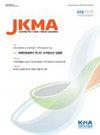胃食管反流病的外科治疗
IF 0.5
Q3 MEDICINE, GENERAL & INTERNAL
引用次数: 0
摘要
背景:胃食管反流病(GERD)是最常见的上消化道疾病之一,影响全球10%至20%的普通人群。当前概念:质子泵抑制剂(PPIs)是本病的主要治疗方法,用于控制症状。在大多数情况下,PPI是经验性处方,可能对30%至40%的患者无效。即使在客观测试后精确诊断为胃食管反流的病例中,随着疾病的长期进展,PPI的效果也会降低。当PPI治疗无效,需要增加剂量时,腹腔镜抗反流手术是一个很好的选择。该手术通过在胃食管交界处建立一个机械抗反流阀,有效地消除了各种反流。在手术前,应通过几项客观检查,包括食管胃十二指肠镜检查、pH监测、压力测量和食管造影,做出准确的诊断。应根据食道运动情况和疾病严重程度,量身定制吻合程度。讨论与结论:腹腔镜抗反流手术可能对食管裂孔疝、食管下括约肌机械缺陷或弱酸性/非酸性反流的胃食管反流患者特别有效。本文章由计算机程序翻译,如有差异,请以英文原文为准。
Surgical treatment for gastroesophageal reflux disease
Background: Gastroesophageal reflux disease (GERD) is one of the most common upper gastrointestinal diseases that affects 10% to 20% of the general population worldwide.Current Concepts: Proton pump inhibitors (PPIs), the main treatment for this disease, is used to control symptoms. In most cases, PPI is prescribed empirically, and may be ineffective in 30% to 40% of patients. Even in cases with a precise diagnosis of GERD following objective tests, PPI becomes less effective as the disease progresses over a long time period. Laparoscopic anti-reflux surgery can be a good option when PPI therapy becomes ineffective and dose increases are required. This surgery effectively abolishes all kinds of reflux by constructing a mechanical anti-reflux valve at the gastroesophageal junction. Before surgery, a precise diagnosis should be made following several objective tests, including esophagogastroduodenoscopy, pH monitoring, manometry, and esophagram. The degree of fundoplication should be tailored according to esophageal motility and disease severity.Discussion and Conclusion: Laparoscopic anti-reflux surgery may be particularly effective for GERD patients with hiatal hernia, mechanically defective lower esophageal sphincter, or weak acidic/nonacidic reflux.
求助全文
通过发布文献求助,成功后即可免费获取论文全文。
去求助
来源期刊

Journal of The Korean Medical Association
Medicine-General Medicine
CiteScore
0.50
自引率
0.00%
发文量
84
审稿时长
4-8 weeks
期刊介绍:
The Journal of the Korean Medical Association (JKMA) is the official peer-reviewed, open-access, monthly journal of the Korean Medical Association (KMA). It contains articles in Korean or English. Its abbreviated title is ''J Korean Med Assoc''. The aims of the Journal include contributing to the treatment of and preventing diseases of public health importance and to improvement of health and quality of life through sharing the state-of the-art scientific information on medicine by the members of KMA and other national and international societies.
 求助内容:
求助内容: 应助结果提醒方式:
应助结果提醒方式:


